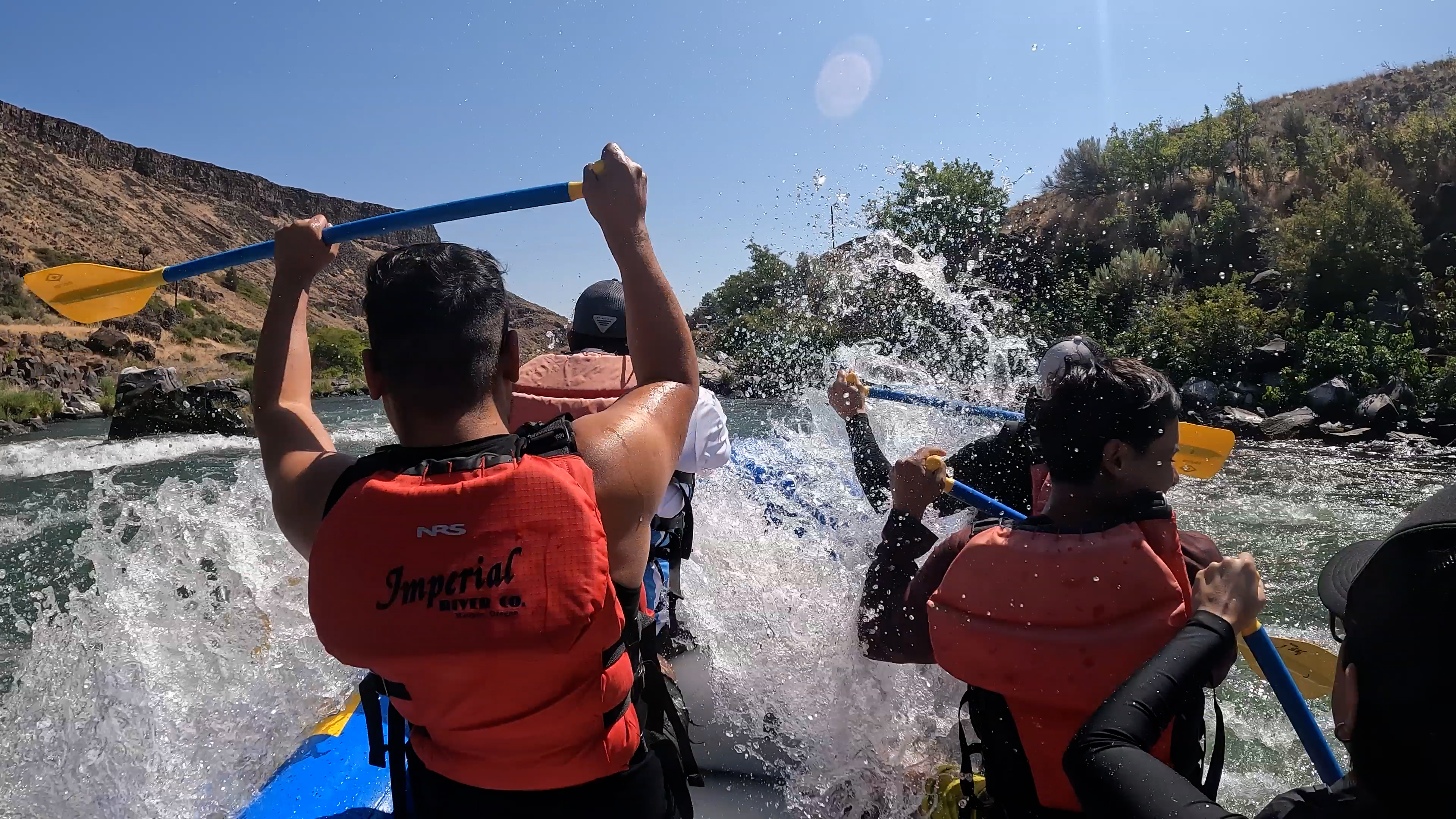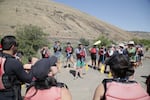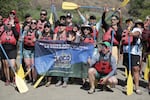
The "loco" raft powering through whitewater near Wapinitia Rapids on the Lower Deschutes River, July 8, 2023.
Dan Evans / OPB
On a hot July day in Maupin, two dozen rafters in borrowed life vests stand clutching paddles at a boat launch on the Lower Deschutes River, listening as a rafting guide goes over the finer points of navigating class III rapids.
To ensure they’ve understood, the leader of the group, Anibal Rocheta, sporting pink sunglasses and a weathered sun shirt, translates the highlights of the presentation into Spanish. Mostly, how not to hit your companions with your paddle.
Rocheta and his partner Maria Teresa Lopes are political refugees from Venezuela and the founders of Loco por la Aventura (that’s “Crazy for Adventure”), a small Portland-based business that aims to make the outdoors more accessible for Oregon’s growing Latino and Hispanic communities, which surged from 2% of the population in 1980 to 14% of Oregonians in 2020.
“I want to show what’s special about the outdoors and how important outdoor activities are for our physical and mental health,” Rocheta says in Spanish.
Climbing, caving and mountaineering are Rocheta’s passions. But he’s happy to take people camping, canoeing or hiking. Anything to spark an interest in the outdoors among a diverse group of people that might bump into a language barrier when trying to get outside in the Pacific Northwest. On this summer day, the adventure is whitewater rafting.
Lopes sees the excitement among a group of young men and teenagers and encourages them to form what she calls a “loco raft.”
“So much energy,” she says in Spanish as they bounce aboard. Lopes joins them in the stern, a broad smile on her face.
Her boundless enthusiasm is a counterpoint to the quiet efficiency of her partner Rocheta. He helps organize the remaining group of older couples, a young family and a quartet of young women into three rafts, and then they’re off.

Anibal Rocheta, with his partner Maria Teresa Lopes over his shoulder, translates the finer points of whitewater rafting for the group. Mostly, how not to hit your companions with your paddle. On the banks of the Lower Deschutes River, July 8, 2023.
Dan Evans / OPB
The river is quick but deceptively placid. Snippets of Spanish and English conversation echo off the hillsides and across the water. The rafting guide in the loco raft, Jody Robertson, valiantly attempts the few phrases he knows in Spanish. Unprompted, he then starts playing reggaeton from a portable speaker. (For those uninitiated, think reggae meets hip hop in Spanish. Or just watch these Bad Bunny videos.) The young men are happy and surprised. Robertson says it’s just the kind of music he likes.
Rocheta was born in Coro, a colonial-era city in Falcón state of northwestern Venezuela, which is famous for its coastline. He grew up miles inland in the Sierra de Falcón mountains, where his grandparents let the young Rocheta explore rivers, forests and hidden caves.
By 17, he was working as a tour guide from the beaches to the mountains in Falcón and soon after earned degrees in tourism services. He met Lopes, his future wife and business partner, as she was finishing her degree in journalism and needed an experienced guide to help her create a documentary about the Sierra de Falcón mountains.
“After she finished her thesis, I invited her to go out several times to ‘celebrate,’” Rocheta says, “until she finally said yes.”
Since then, they haven’t been apart.
The rapids on this section of the Lower Deschutes build in succession, first as a series of exaggerated ripples. Most of the rafters aren’t familiar with the river, and they let out tentative yells as the raft glides over these dips as if to say, “Was that it?”
But the trip hasn’t even really started yet.

Rafting guide Jody Robertson gets drenched in a splash attack between Wapinitia and Boxcar Rapids on the Lower Deschutes River, July 8, 2023.
Dan Evans / OPB
Robertson calls out the first real rapids, Wapinitia, and counts out in Spanish — “¡Uno, dos, tres!”— to synchronize the rafters’ paddling as they power through the whitewater.
They let out a full-throated cheer this time, with Lopes cheering the loudest. As they spin back into flat water, Robertson tells them to raise their paddles, and they clap them together above the raft.
Venezuela has been in a growing political and economic crisis for more than 20 years as former President Hugo Chavez and current President Nicolás Maduro curtailed democracy and forced the country onto an authoritarian path.
In 2015, Rocheta and Lopes decided to leave.
“In our country,” Rocheta says, “there’s no freedom of expression, there’s a lot of crime, and the economic situation in particular for young people who want to start a business is practically nonexistent.”
The United States granted Rocheta and Lopes asylum as political refugees, which allows them to live and work here. They arrived in the United States with two suitcases, very limited English, and their dreams to move forward and build their careers. Their big project would become Loco por la Aventura.

Alejandro Rosendo's companions help pull him back into the raft near Boxcar Rapids on the Lower Deschutes River, July 8, 2023.
Dan Evans / OPB
Many of the rafters on the Deschutes are also immigrants from Venezuela, including brothers Francisco and Alejandro Rosendo. Alejandro is the first rafter to go overboard when the raft turns sideways near Boxcar Rapids and tips him out.
Robertson shouts encouragement to the rafters to pull him up by the shoulder straps of his life vest, and Alejandro quickly flops back into the raft, clutching a water shoe that had popped off his foot.
Seated next to him in the raft, Alejandro’s friend admits that he saw Alejandro going overboard as if in slow motion but didn’t reach out to grab him. They howl with laughter.
When Rocheta looks back at the younger person he was eight years ago, he is filled with a sense of pride in what he has accomplished.
“I know how difficult it is to immigrate, to start from nothing, to not understand the language,” Rocheta says, “and my goal is to help those who are living through that.”
Rocheta took what work he could find while studying English. After his professional credentials from Venezuela were not accepted here, he became recertified as a climbing and mountaineering guide and became one of the first Latino members of Mazamas.
By 2020, Rocheta and Lopes had realized their dream of starting Loco por la Aventura to serve Oregon’s Latino communities and make the outdoors more accessible.

Anibal Rocheta kneels in the foreground of a group photo before the rafts launch onto the Lower Deschutes River, July 8, 2023.
Dan Evans / OPB
After three hours on the river, the group gathers in a park in Maupin to barbecue and hang out before the drive back to Portland. Kicking a soccer ball with his brother, Alejandro Rosendo admits to feeling limited in his English, but he exudes a youthful positivity for the future. After all, he’s only been in the United States for two years.
His brother Francisco has only been here a year, and the 15-year-old’s thoughts seem focused on the more immediate future: improving his soccer game and the next rafting trip.
“I want to come back and do it next year,” he says in Spanish.
Seated nearby in the shade, another Venezuelan immigrant, Maribel Nelson, has lived in Happy Valley for eight years. For Nelson, who switches seamlessly between Spanish and English when speaking with her American-born husband, the day was about building community. It was her first time ever rafting, and she, too, wants to come back and do it again.
Through Loco por la Aventura, Rocheta and Lopes are opening up the outdoors to new people and building a community that is distinctly Oregonian.
Their most recent project is a book, “Nadie logra lo que no se atreve.” It literally translates as “No one achieves what they don’t dare” but means something closer to “Who dares wins.” Rocheta says it’s the first book published in Spanish in the United States on climbing and mountaineering.
Rocheta and Lopes maintain a regularly updated calendar of community events and will hold a book launch party at Arcteryx in Portland on Dec. 7.
Click here to read this story in Spanish. Haga clic aquí para leer en español.




